AI Use Cases in Ecommerce: Changing Online Shopping

Explore the potential of AI use cases in eCommerce. Find out how artificial intelligence is reshaping the future of online shopping experiences.
Key Highlights
- The fast development of AI technologies is transforming e-commerce by improving customer experience and streamlining operations.
- Large Language Models (LLMs) play a crucial role in online shopping with customer specialization, instant support, and predictive analysis.
- Knowledge of LLM functionality and uses in eCommerce can give businesses a competitive advantage.
- Implementing AI also poses challenges such as data privacy, expenses, and integration obstacles.
Introduction
The e-commerce industry has experienced unprecedented growth over the past decade, driven by advancements in technology and shifts in customer behavior. In commercial use, Large Language Models (LLMs) are one of the most influential AI technologies that are reshaping customer experience and operational efficiency in e-commerce.
In this blog, we will delve into the basics of LLMs, their integration into e-commerce platforms, and the significant benefits they bring. We will also explore some of the best AI use cases in e-commerce and analyze the challenges faced during implementation.
Basics of LLM
Large Language Models (LLMs) are AI systems created to comprehend, produce, and control human language. These models utilize deep learning structures, specifically neural networks with billions of parameters, which empower them to analyze and produce text with exceptional precision.
LLMs utilize a form of machine learning known as deep learning, where the models can autonomously learn to identify differences. LLMs are trained on vast text data from various sources like books, articles, websites, and social media. They predict the next word, identify patterns, and grasp context during training, enabling them to handle tasks like translation, summarization, and conversations.
How Do LLMs Relate to E-commerce?
These AI models excel in learning natural language processing, making them perfect for e-commerce sequential data. LLMs can predict customer behavior, personalize recommendations, optimize pricing, and enhance the customer experience. By using big language models, companies can revolutionize e-commerce with data-driven insights that enable targeted marketing, customer engagement and operational efficiency. Leveraging them helps organizations stay competitive and meet the demands of the digital marketplace.
Benefits of LLM in Ecommerce
In the ecommerce industry, the benefits of using LLMs are numerous. Some of the most significant advantages include:
Customer Experience
LLMs contribute to a more personalized and engaging shopping experience. By providing tailored recommendations, accurate responses from chatbots, and relevant content, customers enjoy a more satisfying and efficient shopping journey. Retailers can collect customer feedback continuously with LLM.
Efficiency
Automation of routine tasks, such as generating product descriptions and handling customer queries, allows e-commerce businesses to streamline operations in real-time. This efficiency can lead to cost savings and better allocation of resources.
Decision-Making
Predictive analytics powered by LLMs offer valuable insights into customer behaviour, sales forecasting, and market trends. This information enables eCommerce businesses to make data-driven decisions, optimize inventory, and refine marketing strategies in the sales process.
Scalability
With AI algorithms LLMs can handle large volumes of data like current and historical data to inform predictions and customer interactions simultaneously. This scalability ensures that e-commerce platforms can maintain high service levels even during peak periods, such as holiday sales or major promotions to improve customer reviews.
Cost Management
LLMs can automate many tasks, such as customer service and product description writing, reducing the need for human labour and decreasing operational costs. With models like Llama 3.1 70B Instruct and Llama 3.1 405B Instruct provided by Novita AI, you can choose the model for your needs. The former is more cost-effective and the latter one is loaded with more parameters.


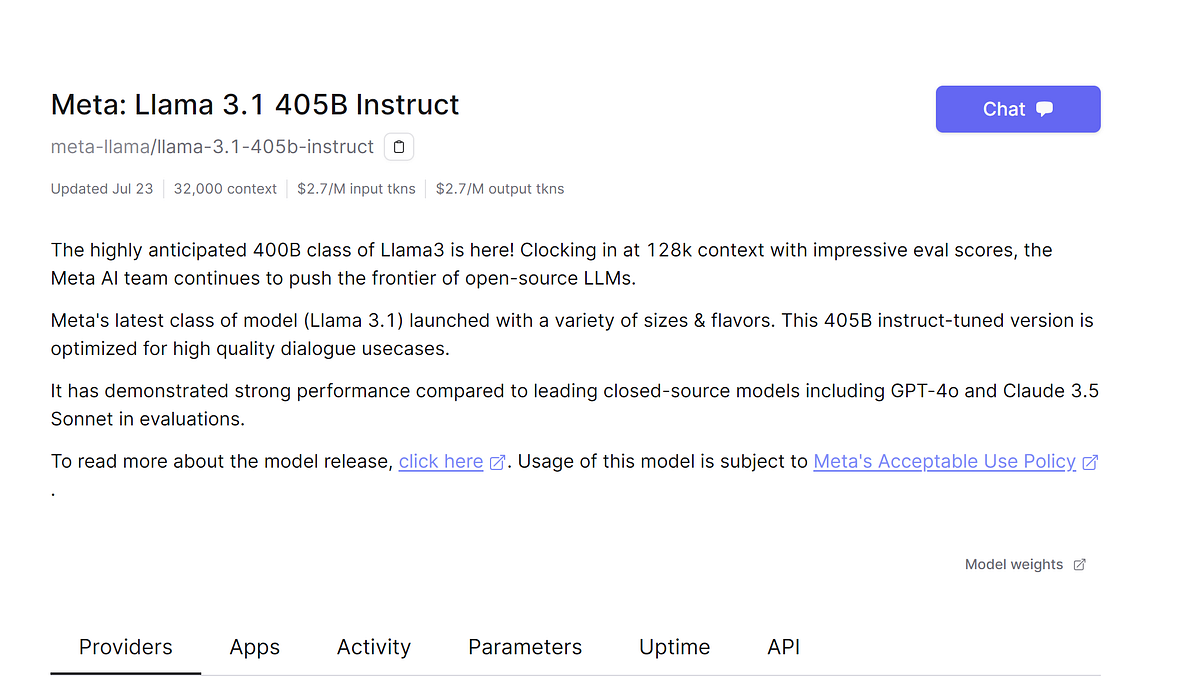

Increased sales
By providing relevant product recommendations and optimizing product details based on purchase history, LLMs can help increase sales and revenue.
Best AI Use Cases in Ecommerce
AI has revolutionized the e-commerce industry with competitive advantages by offering innovative solutions to enhance customer experience, streamline operations, and drive sales. Here are some of the best AI use cases in e-commerce. You can consider those best practices.
1. Personalized Shopping Support
AI personalization engines use LLMs to analyze customer data and deliver tailored product recommendations. These systems suggest products based on past purchases and browsing history, boosting sales and customer loyalty. These tools handle various inquiries, providing instant responses. LLMs help chatbots generate human-like responses for more effective interactions at the right time.
2. Content Creation
In the online shopping world, creating engaging and relevant product descriptions is crucial for eCommerce retailers. LLMs can automatically generate high-quality product descriptions, blog posts, and other content, reducing the need for manual writing and ensuring consistency and user experience across the website. This automation not only saves time but also enhances the overall experience of online shoppers.
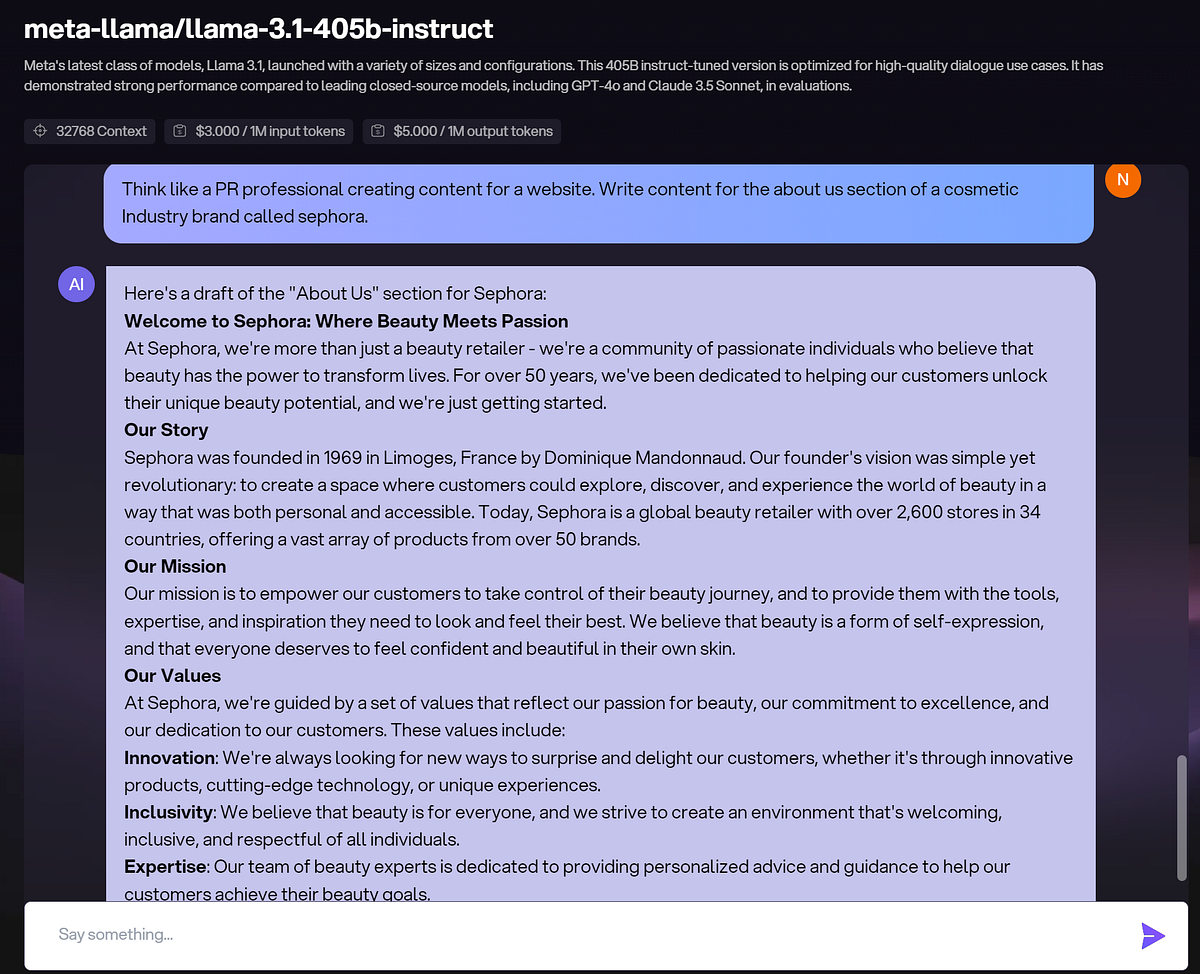
3. Dynamic Pricing
LLMs analyze market trends, competitor pricing, and customer needs to adjust prices dynamically. This approach helps retailers optimize pricing strategies. For instance, Walmart uses AI to adjust prices in real time based on various factors, improving profitability and competitiveness to keep potential customers and customer satisfaction.
4. Inventory Management
AI technology utilizes advanced predictive analysis to optimize inventory management beyond traditional methods. Machine learning enables accurate inventory forecasting, reducing lost sales due to stockouts. AI streamlines warehouse management by automating storage and retrieval processes with bots.
5. Predictive Analytics
LLMs can analyze large datasets to identify trends and predict future customer behaviour. By leveraging predictive analytics, e-commerce businesses can anticipate demand, optimize inventory management, and tailor marketing strategies to target specific customer segments more effectively.
6. Customer Segmentation
By categorizing customers according to their behaviour, preferences, and demographics, businesses can develop precise marketing strategies. AI technology can assist companies in offering tailored promotions and products, resulting in increased conversion rates and improved business performance indicators.

Sample Code
from openai import OpenAI
client = OpenAI(
base_url="https://api.novita.ai/v3/openai",
# Get the Novita AI API Key by referring: /docs/get-started/quickstart.htmll#_3-create-an-api-key
api_key="
)
model = "meta-llama/llama-3.1-405b-instruct"
stream = True # or False
max_tokens = 512
chat_completion_res = client.chat.completions.create(
model=model,
messages=[
{
"role": "system",
"content": "Act like you are a helpful assistant.",
},
{
"role": "user",
"content": "Hi there!",
}
],
stream=stream,
max_tokens=max_tokens,
)
if stream:
for chunk in chat_completion_res:
print(chunk.choices[0].delta.content or "", end="")
else:
print(chat_completion_res.choices[0].message.content)
7. Boost Omnichannel Presence
Use AI to process customer data for personalized content across various touchpoints like email, social media, and advertising. Utilize an AI-powered product search platform to gather and share data across eCommerce platforms for an omnichannel customer experience.
8. Fraud Detection and Prevention
With the power of AI, these models are employed to detect and prevent fraudulent activities in e-commerce. By analyzing transaction patterns and user behaviour of the online store, LLMs can identify suspicious activities and flag potential fraud in business operations.
How To Integrate LLMs
1. Choose a Model and Obtain Access
Select an LLM that fits your needs. You need to register and obtain an API key.
2. Set Up the Environment
Ensure your development environment has the necessary libraries installed, such as requests (for API calls) or specific SDKs.
3. API Calls
Write code in a programming language (like Python) to call the LLM’s API, send requests, and handle responses.
Sample code
import requests
api_key = 'YOUR_API_KEY'
url = 'https://api.openai.com/v1/engines/davinci/completions'
headers = {
'Authorization': f'Bearer {api_key}',
'Content-Type': 'application/json',
}
data = {
'prompt': 'Hello, how can I integrate LLMs?',
'max_tokens': 50,
}
response = requests.post(url, headers=headers, json=data)
print(response.json())
4. Handle Responses
Parse the data returned by the API, extract the needed information, and perform subsequent processing.
5. Integrate into Applications
Incorporate the API call and response handling logic into your application, such as chatbots, content generation tools, etc.
6. Optimize and Debug
Adjust parameters based on usage to optimize the model’s performance, ensuring it meets business needs. Regularly monitor API usage, address potential errors, and manage performance issues.
How to use LLM with Novita AI
If you don’t want to be bothered do the steps above. As mentioned before, Novita AI is a user-friendly and affordable platform ready to offer LLM API services for AI needs.
Simple Guide to Using Novita AI LLM API
- Step 1: Visit Novita AI and create an account.

- Step 2: Go to “LLM API Key” to get an API key from Novita AI.

- Step 3: Click on Model API under the “Products” tab. Look for the LLM service in the LLM column or the Hot Column under “Featured AI APIs”.

- Step 4: Enter the LLM service page, and click API Reference.
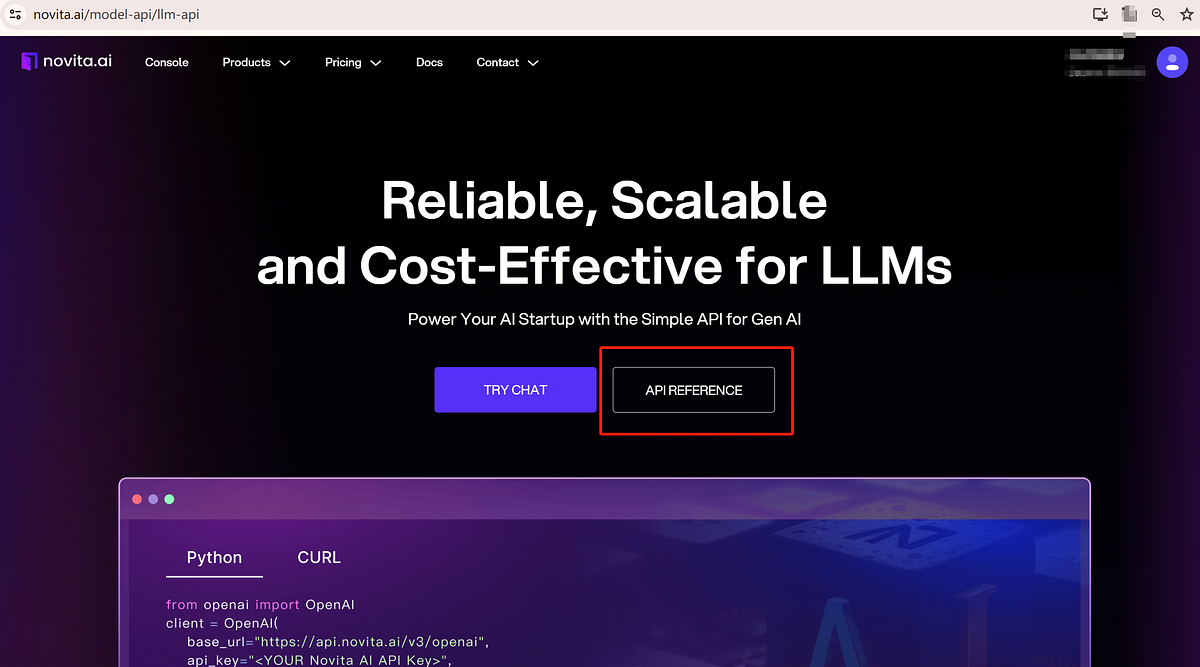
- Step 5: Find the “LLM” in the “LLMs” section. Install the Novita AI API using the programming language’s package manager, then initialize it with your API key to start using the LLM.

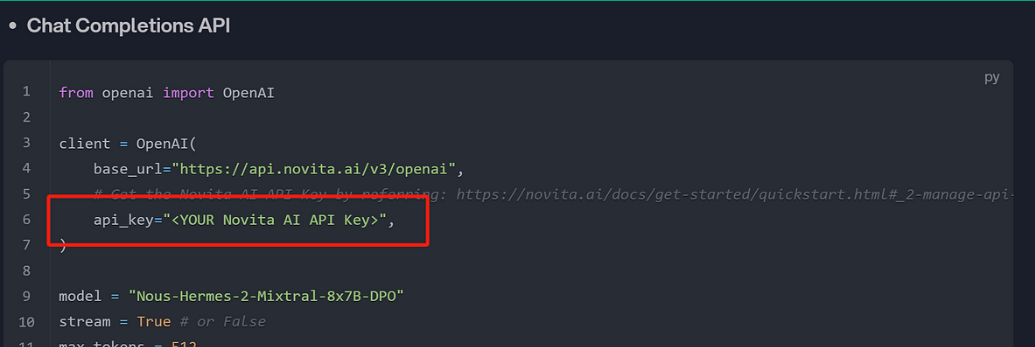
- Step 6: Adjust parameters like in the following image to train models.

- Step 7: Thoroughly test the new LLM API before fully implementing it.
Sample Chat Completions API

Besides the LLM API service, you can also try LLMs for LLM services on the playground.
Try it on the playground.
- Step 1: Visit Novita AI and create an account.
- Step 2: Navigate to the “Products” tab and select Model API. Look for “Featured AI APIs” at Novita AI to find the LLM service in the first or second column.
- Step 3: Navigate to “Try Chat” to start trying.

- Step 4: Choose a model from the list. Customize settings such as temperature and max_tokens based on your requirements. Input a system prompt and click the right button for instant content.
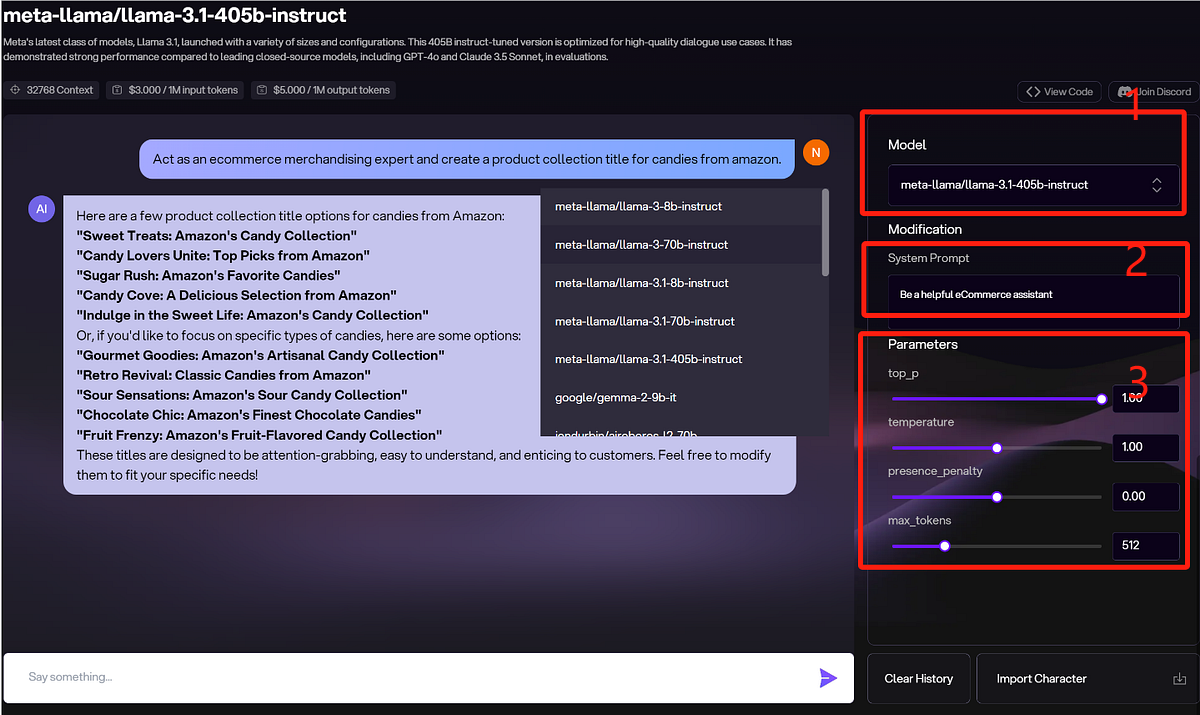
To enhance the quality of the result, consider incorporating more detailed information. Below are some extra details that could be included:
- Product specifics: Identify the specific products the customer expressed interest in, such as items in their shopping cart or recent views.
- Usage data: Include data such as their length of loyalty program membership and previous purchases within the same category.
- Brand tone: Maintain the brand’s voice, adjusting formality based on the type of email and the recipient.
- Call to action reasons: Present reasons for taking action, such as limited-time promotions ending soon or the risk of missing out on an opportunity.
- Testimonials: Utilize social proof like reviews or testimonials to sway customer decisions.
Here are some sample prompts.
- Behave as an expert in eCommerce merchandising and craft a product collection description for the [product] by the [brand].
- Create a product title for the “[product]” from “[brand],” a [industry] brand, as an eCommerce merchandising specialist.
- Craft homepage content for a [industry] product by the brand “[brand]” as an eCommerce content writer.
Challenges of Using AI in Ecommerce
Data privacy and security
Ensuring data privacy and security is critical, as data breaches can lead to significant legal and reputational consequences. E-commerce organizations must comply with data protection regulations and implement strong security measures.
Integration Complexity
Incorporating large language models into existing e-commerce systems requires significant technical expertise. Organizations must address compatibility issues, ensure seamless integration with other systems, and train employees to effectively use AI tools.
Bias and Ethical Considerations
AI models, including big language models, may inadvertently perpetuate biases present in the training data. E-commerce organizations must carefully address and mitigate these biases to ensure fair and ethical use of AI technologies.
Conclusion
Artificial intelligence technologies, such as big language models, are transforming eCommerce through enhanced personalization, improved customer support and optimized operations. While the benefits are significant, including increased efficiency and improved decision-making, organizations must address challenges such as data privacy, cost and integration complexity. To remain competitive and provide a superior customer experience, organizations must effectively leverage AI in the evolving e-commerce landscape. Understanding the capabilities and limitations of big language models will help navigate the digital transformation journey and unlock the full potential of AI for success.
Novita AI is the All-in-one cloud platform that empowers your AI ambitions. Integrated APIs, serverless, GPU Instance — the cost-effective tools you need. Eliminate infrastructure, start free, and make your AI vision a reality.
Recommended Reading
1.Large Language Models for Commercial Use: A Comprehensive Understanding
2.LLM Advertising: Develop with Expert Strategies